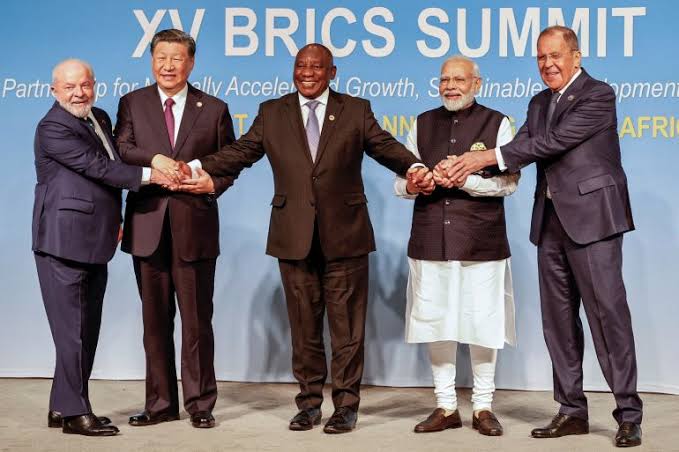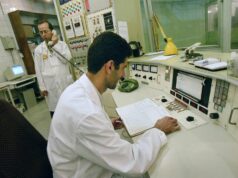Three Arab nations are a positive addition to BRICS, without question

By Ebrahim Hashem
The recent 15th BRICS summit arrived at a critically significant economic and political juncture in the Arab and global history. The successful completion of the summit is a major milestone in the journey toward multipolarity ; it was BRICS’ most important summit since its inception in 2009. Inviting three Arab nations, the UAE, Saudi Arabia and Egypt, to join the group has positive implications for the region and the world.
Most of the world, including the Arab world, is interested in multipolarity and multilateralism and is against protectionism and unilateralism. The region and the world are already beyond unipolarity and hegemony; they are in the process of establishing a new order, preferably through meaningful structural changes to the current security and governance architecture.
Therefore, expanding BRICS to include six more nations will add impetus to the critical mass gathering behind the push for reform and change at global and sub-global levels. The expected high-level policy coordination among the BRICS+ members will facilitate the birth of multipolarity in the world, including in the Middle East.
There is no question that the Arab world is becoming one center of power in the rapidly changing world. Out of more than 40 countries that have officially applied or expressed an interest in joining, three important Arab countries have been selected to join BRICS. This demonstrates the strategic, economic and political significance of the Arabs’ role in forming a new world order.
In BRICS, the three Arab countries do not only represent their individual national interests, but also the aspirations of more than 450 million Arabs. Those three countries are the nucleus for Arab unity, integration and development.
The UAE, Saudi Arabia and Egypt have been trying to rally the Arabs behind a new vision for their region and the world; they work toward uniting the Arabs as one important pole in the emerging multipolar world.
The decision to include the three Arab nations was not surprising. The UAE is one of the largest trading nations in the region and the 11th largest exporter in the world. Also, the UAE is one of the largest six oil exporters; it holds about six percent of global oil proved reserves. Saudi Arabia is the top Arab economy and the biggest oil exporter in the world, holding more than 17 percent of the world’s oil-proved reserves.
Saudi Arabia is a significant member of the G20 and the leader of OPEC. The Sovereign Wealth Funds (SWF) of the UAE and Saudi Arabia are among the top 10 in the world. Egypt is geographically strategically located at the intersection of three continents and in the heart of global trade routes.
It overlooks and administers some critically strategic waterways such as the Suez Canal, through which around 12 percent of global trade and 30 percent of global container traffic pass annually. Egypt is the most populous Arab country with high economic growth and consumer market potential. There is no doubt that the Arabs will be a net positive addition to BRICS.
The UAE, Saudi Arabia and Egypt are the top three economies in the Arab world; their combined GDP is around $2 trillion. Equally important is the fact that the UAE and Saudi Arabia are among the top oil exporters; the current BRICS members such as China and India are major energy consumers and the main drivers behind global oil demand growth.
Hence, having the UAE and Saudi Arabia, in addition to Russia, in the BRICS grouping will help better coordinate energy policies among some key oil producers and consumers, boding well for oil market stability and predictability.
For the Arabs, the BRICS platform provides a great opportunity to deepen and diversify their partnerships with the Global South countries which account for around 80 percent of the world’s economic growth. Arab nations are gradually plugging into the new emerging economic blocs, especially those in Asia. The UAE and Egypt are already members of the BRICS’ New Development Bank (NDB); Saudi Arabia is expected to join the bank soon. Arabs’ top two trading partners and largest oil markets are in BRICS, namely China and India.
Between 2018 and 2022, the UAE-BRICS trade was $677 billion. In 2022, the bilateral trade between Saudi Arabia and BRICS countries exceeded $160 billion. The two Asian giants, China and India, are the key contributors to global oil demand growth just as they are the main drivers behind global economic growth.
Trade between the Arabs and BRICS countries is expected to grow even more in the coming years. China and India are expected to remain the main oil markets for the Arabs in the foreseeable future. These trends are not expected to change any time soon.
The Arabs are acutely aware that the current fluid regional and global landscape presents a myriad of opportunities and challenges. Geopolitically, the Arabs understand that, by joining BRICS, they will have a powerful and useful platform through which they can protect their strategic autonomy and sovereignty, while contributing to shaping the future of their region and the world.
Although BRICS has focused primarily on economics so far, the fast-changing and increasingly complex world requires it to tackle subjects beyond the realm of economics. Some key BRICS members are also included in the Shanghai Cooperation Organization (SCO), which is mainly about security.
The work of the two groups dovetails nicely together; the three invited Arab nations are already involved in SCO as Dialogue Partners. Perhaps, soon, the work of the two groups will be synergized so that the members can discuss and deal with issues more holistically.
As BRICS becomes more institutionalized and as strategic coordination among its partners becomes more effective, the group is expected to be a stronger advocate of multilateralism and a real force behind the push for a renewed world system. All BRICS countries, including those who have just been invited, have been on the receiving end of destructive unilateralism and protectionism.
Therefore, they all know the harmful impact of unilateral and protectionist policies and actions. However, for the common prosperity of most humanity, the BRICS countries are expected to boost global multilateralism and multipolarity in various areas, including but not limited to economics, diplomacy, culture, politics, technology and conflict resolution.
The large number of countries interested in joining BRICS proves that the group is growing in influence, power and attractiveness. The newly invited countries largely share the same vision for the world as that of the current BRICS nations. As outlined in the Johannesburg II Declaration, the BRICS nations want to establish a fair, equitable and balanced world order; they are against unilateralism, fragmentation, coercion and protectionism.
This vision is appealing to most countries in different regions of the world. The rapidly rising momentum behind BRICS shows that there is a dire need and clear urgency for reform. The BRICS grouping is viewed as the vehicle through which the current broken global system can be improved, democratized and fixed.
BRICS is proving that it is not all bark and no bite. More than 45 percent of the global population, 30 percent of global GDP, and more than 40 percent of global oil production are included in BRICS+; no other grouping or gathering has such a massive heft.
The world is in transition; it is slowly but steadily moving toward deeper, yet to be institutionalized, multipolarity. The expanded BRICS is expected to accelerate global multipolarity and enhance multilateralism. The Arabs are confidently carving out an important place for themselves in the new emerging world. This is truly a historic moment for the Arabs and the Global Majority; they must rise to the occasion, take their fate in their own hands, and shape the future.



